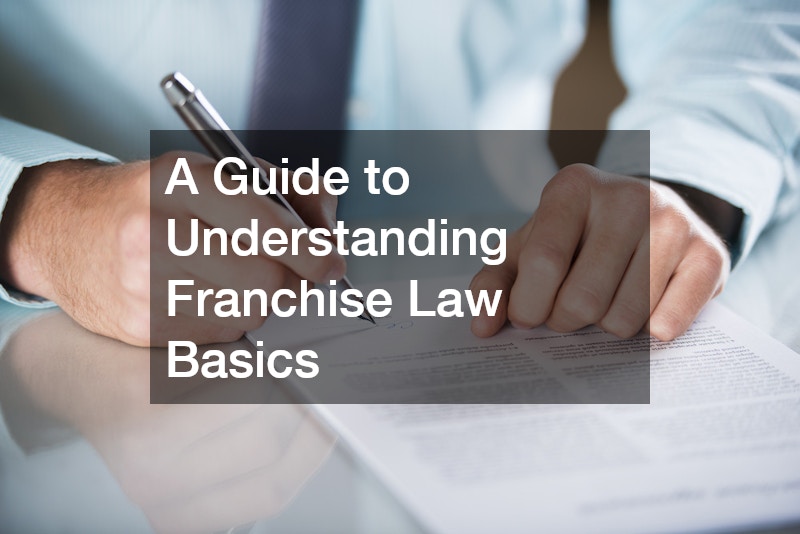
In today's competitive business landscape, franchising is a popular avenue for both budding entrepreneurs and established businesses. However, before diving into this promising business model, it is crucial to understand the fundamentals of franchise law. This guide aims to provide a comprehensive overview of franchise law basics, helping you navigate the complex legal landscape with confidence.
Video Source
Franchise law refers to the body of law that regulates how franchises are created, operated, and terminated. It encompasses both federal and state regulations that outline the rights and obligations of franchisors and franchisees. The purpose of franchise law is to ensure fair dealings and protect both parties in a franchise agreement. At its core, franchise law addresses issues like franchise disclosure documents, registration requirements, and a wide range of ongoing operational compliance matters. Without a robust understanding of franchise law, both franchisors and franchisees risk facing legal challenges that could jeopardize their business operations.
One of the primary components of franchise law is the franchise disclosure document (FDD). The FDD offers prospective franchisees detailed information about the franchise, encompassing the business experience of the franchisor, any bankruptcy filings, litigation history, financial statements, and more. This document is legally required to be provided to potential franchisees at least 14 days before any agreement is signed or money is exchanged. The intent behind the FDD is to foster transparency and ensure that prospective franchisees have a clear understanding of what they're getting into before entering an agreement.
Franchise law also dictates the ongoing relationship between franchisor and franchisee. The agreements must outline the responsibilities and rights of each party, addressing issues such as territory rights, fees, and operational support. It's also crucial for these agreements to detail the procedures for conflict resolution and termination. In this way, the franchise law aims to balance power and ensure fair dealings, enabling both parties to focus on growth and success. Ignoring these aspects can lead to disputes and expensive litigation, emphasizing the importance of understanding franchise law fundamentals.
Franchise agreements are legally binding contracts that form the cornerstone of any franchise relationship. They lay out the terms and conditions under which the franchisee is allowed to operate under the franchisor's brand name and business model. These contracts are comprehensive, covering areas like initial investment costs, franchisor’s obligations, and duration of the agreement. When well-drafted, these agreements can prevent misunderstandings and disputes, providing a clear and stable foundation for the franchise relationship. However, without a thorough understanding of what these agreements entail, a franchisee may inadvertently find themselves entangled in unfavorable situations.
A critical part of the franchise agreement is the detailed specification of each party's duties and obligations. This includes specifics on the support the franchisor will provide, such as training and marketing resources, as well as the franchisee's responsibilities in adhering to operational standards. The contract should also address renewal terms and potential repercussions should either party breach the agreement. Clearly defining these areas can significantly reduce conflicts and ensure both parties are on the same page from the start.
Another essential element to consider is the termination and transfer conditions in the franchise agreement. These terms dictate under what circumstances a franchise can be terminated or transferred, often stipulating that the franchisee must notify the franchisor of their desire to terminate within a specific timeframe. Additionally, the agreement should outline what happens to the business assets upon termination or transfer. Both franchisors and franchisees must review and understand these clauses fully, as they can have lasting financial and operational impacts.
Compliance with franchise law is crucial for the smooth operation of any franchise business. Franchisors have the responsibility to ensure their franchisees are adhering to the stipulations set out in the franchise agreement and to all state and federal regulations. For franchisees, compliance involves not just following the franchisor's business model but also adhering to local business laws and regulations specific to their industry. Ensuring compliance not only mitigates legal risks but also fosters a strong and unified brand identity across the franchise network.
Franchise operations often require coordinated efforts in compliance training and audits to prevent any regulatory breaches. This includes regular reviews and updates to procedures in alignment with industry standards and legal requirements. Franchisors usually provide ongoing support and resources to help franchisees maintain compliance. Additionally, franchisees should engage legal counsel to stay informed of new regulations and to guide any modifications needed in operations. Comprehensive compliance measures are crucial for mitigating potential risks and ensuring sustainable growth.
Non-compliance can lead to severe penalties and damage to the franchise’s reputation. Legal disputes arising from non-compliance are not only time-consuming but can also be costly, disrupting the operations and profitability of the franchise. Therefore, both parties must prioritize understanding and implementing the compliance measures outlined in the franchise agreement. Compliance forms the backbone of trust between franchisor and franchisee and is integral for a long-term, successful relationship. Additionally, compliance initiatives can boost the franchise's credibility in the market, attracting more potential franchisees and customers.
